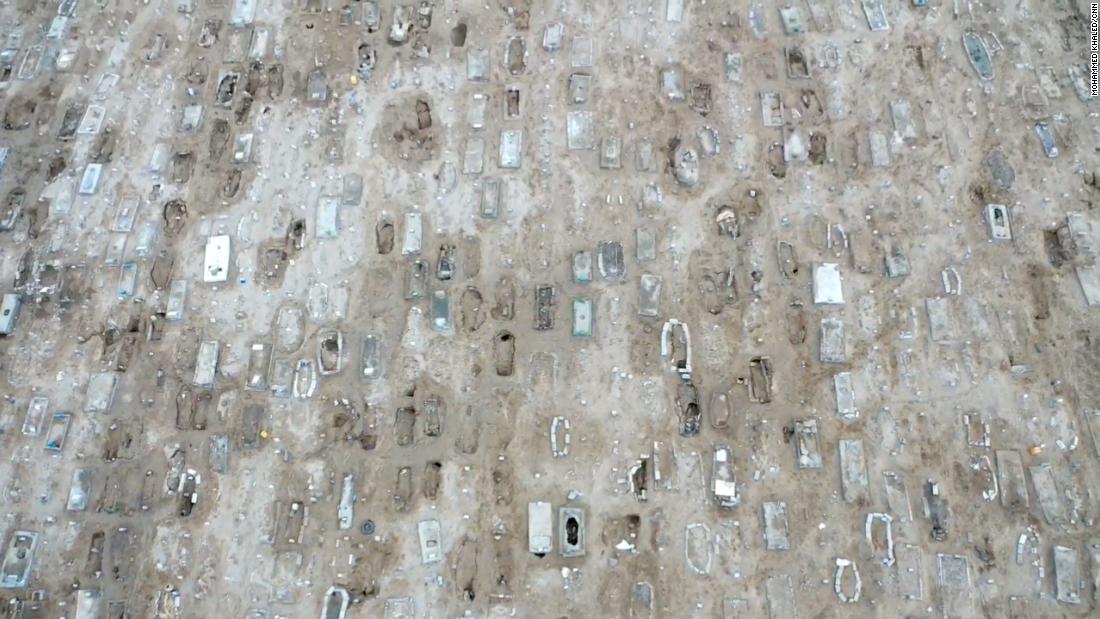In Aden, Yemen, coronavirus mortality rates are worse than deaths during the war

Al Radwan Cemetery has expanded rapidly in recent months, with new graves approaching the apartment buildings that border it. “You can see my digging machine,” Saleh says. “I just dug up 20 graves.”
Local medical authorities say the death rate in Aden is rising this year, despite the relative lull in the war that has ravaged the place in previous years.
In the first half of May, the city recorded 950 deaths – nearly four times as many as 251 deaths throughout the month of March, according to a report from the health ministry.
Those 950 deaths in the two weeks in May represent nearly half the number of victims the city suffered in all of 2015, when the country’s civil war raged.
Then Aden was ravaged by heavy fighting, the streets were destroyed by rockets, and the houses were filled with bullets. Now the biggest killers in town are silent.
“Yemen has faced wars and cannot cope with three pandemics, economic collapse and war and coronavirus,” Ishraq Al-Subei, a health official responsible for responding to the disease, told SETimes.
The official number of Covid-19 deaths in southern Yemen is only 127. Health workers say they do not know the actual number, due to low testing capacity. But the large increase in deaths in Aden is seen as a warning that it will get worse as the health sector becomes overcrowded and more and more people die from treatable diseases.
Looking for a hospital bed
Hmeid Mohammed, 38, had a grueling journey that began at home with a mild fever.
His family could not find a hospital that could take him when his fever began to rise sharply in early May. He was in a coma when he was admitted to the only hospital in Aden that was then appointed to treat Covid-19.
“They brought him back to life,” his son-in-law Anwar Motref recalled.
He was diagnosed with meningitis, another common disease in Yemen. As soon as he showed signs of improvement, doctors advised him to leave the hospital so as not to become infected with Covid-19.
About a week later, his health deteriorated. The family again went to various hospitals with the intention of acknowledging him, but with little success. They eventually found him in a bed he shared with six other people. The fluid filled his lungs, and his kidneys failed.
The family had funds for treatment, but Aden’s hospitals were either closed or full. The search for a hospital admission that could perform surgery and dialysis in time to save him failed.
Mohammed died in late May, robbing his three children and the widow of the only bread winner in the family.
“Who is to blame for all this? We don’t have a government or a state or anyone who could help us in this country,” Motref said at the family home on the rocky hills around Aden.
“Who should we complain to? We are tired of this life. We wake up every morning when we hear 10-15 people die,” he added.
Support is disappearing and the health sector is collapsing
Rifles in Aden have become quieter in recent months, but the war in Yemen has not disappeared.
Five years of conflict began with the people. Today, more than half of the population relies on survival aid.
“We are missing a billion for our minimum goal,” Lise Grande, head of UN humanitarian operations in Yemen, told CNN. “So, in Covid’s time, that means we’re going to see about half of the hospitals we’re currently supporting in the country closed – and that’s going to happen in the next few weeks.
“A week before the first Covid-19 case was confirmed in Yemen, we ran out of money and had to stop benefits for 10,000 health workers from across the country. In the middle of Covid, it is a devastating situation,” she added.
There are only 60 hospital beds dedicated to Covid-19 in Aden which has about 800,000 inhabitants. These are in two hospitals operated by Doctors Without Borders (MSF). The city has 18 fans, all of which are constantly used, MSF reports.
Doctors and assistants say patients generally seek hospital treatment in the late stages of the disease, when it is probably too late to save them. And in most cases there is no option for their treatment.
“Most cases are rejected because there are no fans available,” Dr. Farouk Abduallah Nagy, head of the isolation department at Gomhuria Hospital, told CNN.
“The health sector was already weak before the outbreak. And it’s getting worse and worse. The health sector is failing,” said Caroline Seguin, MSF’s communications officer in Aden.
More than 112,000 people were killed in airstrikes, shelling and bombing, according to the Armed Conflict and Event Data Project (ACLED).
Hundreds of thousands of people were deported to concentration camps as refugees from the war. There, they face the risks of endemic disease, malnutrition and overcrowding – all ideal conditions for the spread of diseases like Covid-19.
Mokhtar Ahmed, originally from the port city of Hodeida in the north, came to the camp on the outskirts of Aden three years ago.
“Cholera and wars are one thing, and the crown is something else,” he told CNN, which featured his two children.
“With the war we moved from one place to another and settled … But with the crown, no matter where you go, they will find you.”
Ahmed Baider contributed to this report from Sanea. Mahmoud Nasser and Mohammed Khaled contributed to Aden to this report.

Zombie aficionado. Typical introvert. General creator. Beer practitioner. Web fan. Music nerd.



